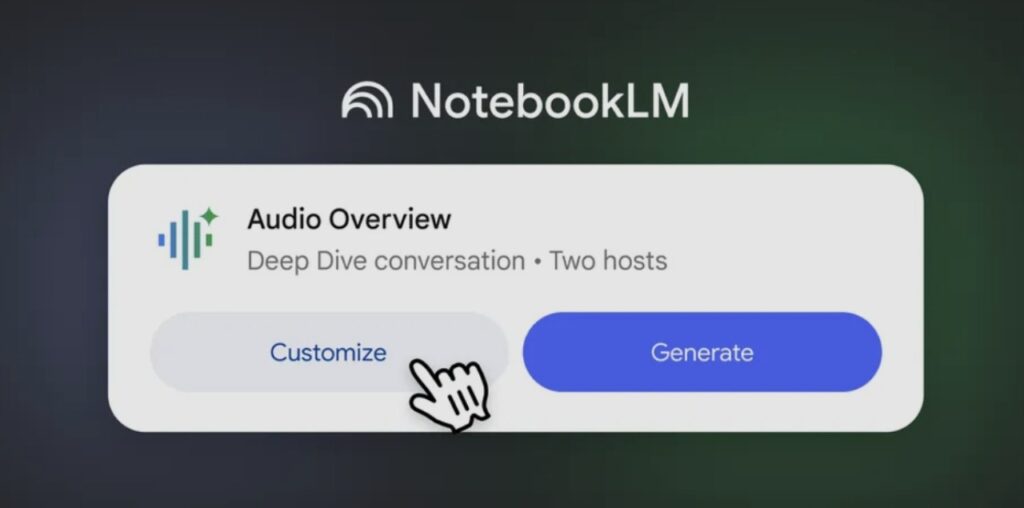Google’s NotebookLM, an AI-powered note-taking and research tool, has taken a significant leap forward with its latest update. The introduction of customizable Audio Overviews, along with other enhancements, marks a new chapter in AI-assisted learning and research. This development not only showcases Google’s commitment to innovating in the AI space but also highlights the growing trend of personalized, AI-driven educational tools.

Customizable Audio Overviews: A Closer Look
Key Features
- User-Defined Focus: Users can now instruct AI hosts on specific topics to discuss.
- Audience Tailoring: Conversations can be customized for different audience types or knowledge levels.
- AI Host Interactions: Two AI hosts engage in a “lively” discussion based on user-provided sources and instructions.
How It Works
- Open a notebook in NotebookLM
- Select “Notebook guide”
- Navigate to “Deep dive conversation
- Click “Customize”
- Enter specific instructions for the AI hosts
Implications and Use Cases
This feature opens up a range of possibilities for users:
- Targeted Learning: Students can focus on specific aspects of a topic they find challenging.
- Presentation Preparation: Researchers can generate discussions tailored to their target audience.
- Multi-Perspective Analysis: Users can explore different viewpoints on a subject by adjusting host instructions.
Other Notable Updates
1. Removal of “Experimental” Label
Google has taken NotebookLM out of its experimental phase, indicating increased confidence in the tool’s stability and usefulness.
2. Background Listening
Users can now listen to Audio Overviews while working in other areas of the app, enhancing multitasking capabilities.
3. Enhanced YouTube Video Analysis
NotebookLM can now provide deeper insights into YouTube videos by analyzing their transcriptions.
The Evolution of AI-Assisted Learning
From Static to Dynamic Content
NotebookLM’s Audio Overviews represent a shift from traditional, static note-taking to dynamic, interactive learning experiences:
- Engagement: Audio discussions can be more engaging than text-based summaries.
- Retention: Interactive, conversational formats may improve information retention.
- Accessibility: Audio formats cater to different learning styles and preferences.
Personalization in Education
The ability to customize AI-generated content aligns with broader trends in educational technology:
- Adaptive Learning: Content adjusts to individual user needs and preferences.
- Diverse Perspectives: Users can explore topics from various angles by tweaking AI instructions.
- Scaffolded Learning: Conversations can be tailored to gradually increase in complexity.
Ethical Considerations and Limitations
Potential Concerns
- Information Accuracy: AI-generated discussions may not always be fully accurate or comprehensive.
- Over-reliance on AI: Users might depend too heavily on AI-generated content instead of developing critical thinking skills.
- Echo Chambers: Customization could potentially reinforce existing biases or limit exposure to diverse viewpoints.
Google’s Approach
Google addresses some of these concerns by:
- Clearly stating that Audio Overviews are not meant to be comprehensive or objective.
- Emphasizing that discussions are based on user-provided sources and instructions.
- Encouraging users to view AI-generated content as a starting point for further exploration.
Comparison with Other AI Learning Tools
NotebookLM’s features can be compared to other AI-driven educational tools:
| Feature | NotebookLM | Competitors |
|---|---|---|
| Audio Discussions | Yes, customizable | Some offer, but often pre-recorded |
| YouTube Integration | Yes, with transcription analysis | Limited in most tools |
| Background Listening | Yes | Varies |
| Customization Level | High | Often limited |
User Experience and Accessibility
Enhancing Learning Flexibility
The new features in NotebookLM contribute to a more flexible learning experience:
- Time Efficiency: Background listening allows users to absorb information while multitasking.
- Learning Style Adaptation: Audio formats cater to auditory learners.
- Accessibility: Audio content can benefit users with visual impairments or reading difficulties.
Potential Challenges
Users may face some challenges in adapting to these new features:
- Learning Curve: Effectively customizing AI instructions may require practice.
- Content Overload: The ease of generating discussions could lead to information overwhelm.
- Quality Control: Users need to critically evaluate AI-generated content for relevance and accuracy.
Future Implications and Possibilities
For Education and Research
- Personalized Curricula: Tools like NotebookLM could lead to more tailored educational experiences.
- Research Efficiency: AI-assisted analysis of sources could streamline the research process.
- Collaborative Learning: Future iterations might allow multiple users to customize and share AI discussions.
Potential Feature Expansions
Based on current trends, future updates to NotebookLM might include:
- Multi-lingual Support: AI discussions in various languages or translation features.
- Integration with Other Platforms: Connectivity with learning management systems or research databases.
- Advanced Visualization: AI-generated diagrams or mind maps to complement audio discussions.
Industry Impact
EdTech Landscape
Google’s innovations with NotebookLM could influence the broader educational technology sector:
- Competition: Other companies may rush to develop similar AI-driven learning tools.
- Integration: Educational institutions might seek ways to incorporate such tools into their curricula.
- Research Focus: Increased interest in studying the effectiveness of AI-assisted learning methods.
AI Development
The customizable nature of NotebookLM’s AI hosts could impact AI development:
- User-Centric AI: Greater emphasis on allowing users to shape AI interactions.
- Contextual Understanding: Advancements in AI’s ability to adapt to specific user needs and contexts.
- Ethical AI: Continued focus on developing AI that can provide balanced, accurate information.
Conclusion
Google’s latest updates to NotebookLM, particularly the introduction of customizable Audio Overviews, mark a significant step forward in AI-assisted learning and research. By allowing users to tailor AI-generated discussions to their specific needs, Google is pushing the boundaries of personalized education technology.
The removal of the “experimental” label from NotebookLM signals Google’s confidence in the tool’s capabilities and its readiness for wider adoption. Features like background listening and improved YouTube video analysis further enhance the tool’s utility, making it a more comprehensive platform for digital note-taking and research.
However, as with any AI-driven tool, users must approach NotebookLM with a critical mindset. While the AI-generated discussions can provide valuable insights and alternative perspectives, they should be seen as supplements to, rather than replacements for, traditional research and critical thinking.
As NotebookLM continues to evolve, it will be fascinating to observe how it shapes the landscape of digital learning and research. The tool’s development may well influence educational methodologies, research practices, and even the way we interact with and consume information in the digital age.
Ultimately, NotebookLM’s latest features represent not just an advancement in AI technology, but a step towards a future where learning and information processing are more interactive, personalized, and accessible than ever before.










Add Comment